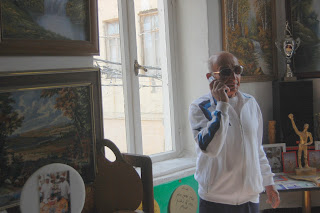Changes in Eden
None of these photographs of old Tel Aviv shops are of Minimarket Eden
At the beginning of every month I get a text message from the local minimarket - Eden -which is spitting distance from the Rooftop. Wherever on the planet I happen to be situated, this text message will politely remind me that its time to settle my monthly tab. This is not the only technological innovation introduced by Nissim, the dynamic young manager. He started a customers club and there was also a deal (which seems to have expired) that returned your VAT if you bought for over 100 shekels. At Minimarket Eden, the shelves are well stocked with goods ranging from basic to organic, the prices are marked and the staff is helpful and friendly.
It wasn't always this way. When we first moved into the neighbourhood the minimarket was run by Arnon and his wife Aliza and was much scruffier and simpler affair. Arnon's father Yosef, who was the original owner, who used to help out in the shop, was the projectionist at the Eden cinema, the first in Tel Aviv, before it closed in 1974. He spoke perfect English which he learned from the British soldiers in the Mandate years.
Under Arnon and Aliza's management, the hygienic conditions were iffy, the supplies patchy and the prices a matter of speculation and sometimes dispute. Arnon, a chain smoker, had a cool style, a quick wit and political tendencies to the right of Atilla the Hun. Aliza's ringing voice would echo around the poorly lit shelves. She could hold basic conversations in 10 languages and was loud, sarcastic and funny. They served sandwiches and Turkish coffee on the spot. You could buy freshly baked beigele from the all night bakery down the road, or lahouh bread from the Yemenite Quarter, Kerem Hateimanim. Your tab was jotted down on a piece of cardboard. Aliza would have no problem reminding you loud, clear and in person that it was time to settle your account but also made exceptions for the old and the poor.
Arnon and I would often start the day with a fierce political argument revolving on some report on the 7 a.m. news, replete with mutual reciminations but always ending in a friendly handshake. Minmarket Eden was a sort of informal community centre with a noticeboard outside and a colourful set of locals who would hang out there to tell a story or share a joke.
At some point Arnon, tired of the long days, brought in Baruch, an oleh chadash from Uzbekistan to help out. Baruch was friendly but had a limited vocabulary in Hebrew which meant that communication was basic. Baruch took the morning shift and I began to miss my morning political arguments with Arnon. A year or so later Arnon had sold out to Baruch completely and was talking about opening a bar. Baruch ran the business for a while but soon was increasingly relying on his son, Nissim, who transformed the place into the technological marvel it is today.
Over the years, both the customers and the staff have changed too. In Arnon and Aliza's time most were local residents who had lived in Neve Tzedek through the years when it was one of the worst slums in Tel Aviv. These were traditional, low income mizrahi families. By the time we arrived they had already been joined a smattering of students and artists. Today, the mix includes Israeli yuppies and foreigners who have bought into the area as well as high-tech workers and diplomats renting apartments.
The workers at today's Minimarket Eden represent tribalized, modern Israel. Nina, hailing from Russia is at the checkout counter, Abed, an Arab from Yaffo, stacks shelves and makes deliveries, Shimon, another stacker, wears a black kippa and can sometimes be seen praying in the corner. Despite their differences they seem to get on well together. Nissim rules with a quiet but firm managerial hand and a very slight Russian accent.
From time to time an African immigrant worker, or perhaps asylum seeker, walks past Minimarket Eden, also looking for his place in the world.









Comments